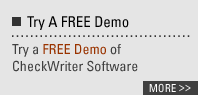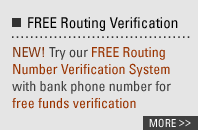
Check Acceptance Policies and Guarantee:
- Will the check be good?
- Do banks accept checks by phone?
- Will all banks accept CheckWriter drafts?
- Are banks required to accept my deposits?
- Is there a funds guarantee?
Overview:
CheckWriter™
software creates a
draft of the check for deposit into any U.S.
bank. When creating a
check draft, the merchant is
creating a demand item that will be accepted for deposit in any
U.S. bank, and will be treated just like a regular check, except
it is for deposit only, not for cash.
Check drafting is simply creating a valid
legal copy of the customer's check. Because it is created by the
merchant, no signature is required. A check draft, also called a
demand draft is for deposit only.
The Uniform
Commercial Code permits the process of
check drafting by
defining signature in the following regulation:
Uniform Commercial Code, Title 1, Section 1-201 (39).
This regulation only makes
check drafting possible, not
"required." Your bank may deny your items for deposit if they
have reason to be suspicious. Suspicious items are covered in
Regulation CC 229.13,
Exceptions.
Reasons for
denial include, but are not limited to the following:
1. History of making deposits that are returned for stop
payment, NSF, refer to maker, UTL, unable to locate, invalid
MICR or other returns.
2. Creating suspicion about the items for deposit. This includes
asking the teller or manager if the item is legitimate, asking
if the item is likely to clear or be returned, questioning the
legality of the deposit.
3. Depositing one or more improperly printed items.
If a bank official thinks there is any reason to refuse your
items for deposit, they can refuse the deposit under Federal
Reserve regulation J. Banks are as likely to refuse certain cash
deposits for the same reasons.
For example, if you go into the bank with a $2,000 deposit and
explain to the teller while your deposit is counted that some
very suspicious characters came into your store today and you
think some of the bills you are depositing may be counterfeit.
This will cause red flags to go off - the teller could refuse
the deposit, or allow the deposit but put a 7 or 14 day hold on
the funds, pending authentication of the bills where suspicion
was created.
Another example would be going to the bank with $200 in quarters
rolled in paper rolls. Depositing these item with
confidence would cause no suspicion, but making a statement
like, "my 10 year old son rolled these up, I wonder how accurate
he really was?", would cause the teller to either refuse the
items, or spend considerable time counting or weighing the
coins. Some banks may impose a surcharge or require the
account number then be stamped on every roll.
This can also
happen with checks or
check drafts. Going up to a teller
and asking if drafts you created at your business are
legitimate, or if they are accepted at the bank will immediately
raise flags. The natural reaction of most teller, bank
managers, and bank call center representatives would be to tell
the client, "no".
Check drafting requires no special license, only the permission
of the account holder.
CheckWriter™ brand software will help telemarketers comply with
the
FTC Regulations 16 CFR 310 in regard to proper record
keeping. This regulation only applies to outbound
telemarketers, and does not cover inbound calls or transactions
between customers where a relationship already exists.
Conclusion:
CheckWriter™
software will automatically format the check draft to comply
with all current banking regulations. When used properly,
pending any suspicion the end user may cause on their own,
drafts printed by
CheckWriter™ brand software are guaranteed to be accepted by
your bank.
Checks by phone:
Learn how to take checks
by phone.

Not convinced?
Click Here to see why you should choose
CheckWriter™.
|





